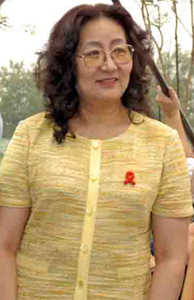|

|
|
Guan Baoying, former chief of Disease Prevention and Control Division under Beijing Municipal Health Bureau.
|
For Guan Baoying, former chief of Disease Prevention and Control Division under Beijing Municipal Health Bureau, two decades' work in the fight against AIDS has seen the rough and the smooth. She has witnessed, and more importantly helped to drive, social change in public attitudes towards the yet-unconquered disease. But she has one great regret: "We missed a golden opportunity of bringing AIDS completely under control," she says with a hint of self-reproach.
At 55, the carefully turned-out and fashionably dressed Ms Guan looks younger than her age. Having started her career as a medical professional in the early 1980s, she retired from her former position last year.
In 1987, Beijing established its first venereal disease prevention institute – Beijing Dermatosis Prevention & Research Center, now called Beijing Venereal Disease Prevention & Treatment Institute. Ms Guan was in charge of AIDS treatment. Three years later, she had her first close encounter with an AIDS case. That patient left a profound impression on her. "Very shocking!" she recalls, "It was in 1990 when You An Hospital received a Chinese medical aid worker who had returned from Africa and had been diagnosed with AIDS. I visited him once. He was exactly as the medical literature portrayed victims – terribly skinny and almost a skeleton."
Afterwards she could not help feeling anxious, though she knew perfectly well that she could not possibly have been infected. As a result, she had all her clothes laundered before returning home. But she was not the only one who was scared. On the patient's death, You An Hospital incinerated everything he had touched: bed, chair, table and quilt, among others. Even the money that the patient had paid was microwaved several times.
A tour in America in 1995 changed Ms Guan's attitude to AIDS quite dramatically. In the US AIDS patients were not quarantined as they were in China, she recollects. Instead, they mixed with other patients, and some social campaigners were active in helping them to reclaim legal rights. For Ms Guan, the deepest impression during the two-week trip was a photo hanging over an AIDS patient's bed, in which the smiling patient was hugging a Hollywood star. Ms Guan looked at the picture and felt ashamed of her prejudices.
After returning to China, she decided to change her approach to her patients. She no longer stood a distance away from them when talking to them. To the surprise of the patients who had been accustomed to long-standing negligence and prejudice, she even started the practice of shaking hands with them.
In 1996, the Joint United Nations Program on HIV/AIDS (UNAIDS) set up an office in Beijing. Under its guidance, Beijing's municipal government initiated interventions among HIV/AIDS risk groups: drug takers, gays and sex workers. At that time, however, these people were viewed as lawbreakers. They kept themselves hidden and were very hard to track down and interact with.
It was hardly surprising that Ms Guan found it extremely difficult to carry out her intervention work. But she finally created an opportunity to meet gays face to face after persuading a gay organization to let her and one of her colleagues join one of their parties. On the way to the party, her nervousness provoked goose bumps and part of her wanted to cancel the plan. But the gays turned out to be gentle and unintimidating in spite of their unaccustomed behavior and manner of speech, she says.
In the mid-1990s, HIV/AIDS spread rapidly across China as a result of improper prevention and treatment measures on the part of authorities. Due to a general prejudice in society, the infected did not dare talk to anyone about their problems and had to suffer in mental and physical solitude. Ms Guan still remembers an "exquisite looking" young man diagnosed with AIDS who begged the hospital not to reveal his disease to his employer for fear of getting fired.
Meanwhile, HIV/AIDS treatment cost so much that it was unaffordable for ordinary families. Together with a number of AIDS patients, Ms Guan drafted a plan to provide free treatment to the victims of opportunistic AIDS infections in Beijing. The plan was later approved by municipal government. Since then, local patients have been afforded this privilege. A co-drafter said that this support program was genuinely effective, and more importantly it signified that the government had a genuine concern about AIDS patients.
In early 2004 China's cabinet, the State Council, established its AIDS Working Committee supervised by Wu Yi, then vice premier. To Ms Guan this was a sign that the central authorities were beginning to give proper attention to HIV/AIDS issues. She seized the opportunity to propose that local government implement three effective major anti-AIDS measures: promoting the use of condoms, setting up methadone clinics, and offering free and safe hypodermic needles and injections to intravenous drug takers. Her suggestions, however, immediately attracted drastic criticism. Some people even accused her of encouraging prostitution and drug taking. Fortunately the local authorities gave the go-ahead to her plan. But her difficulties did not end there.